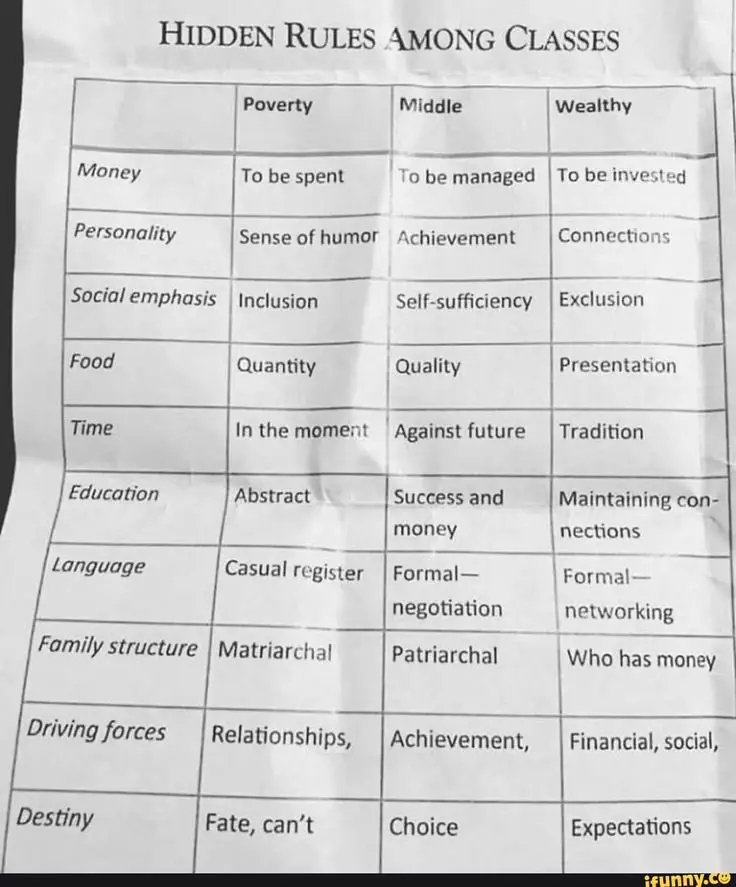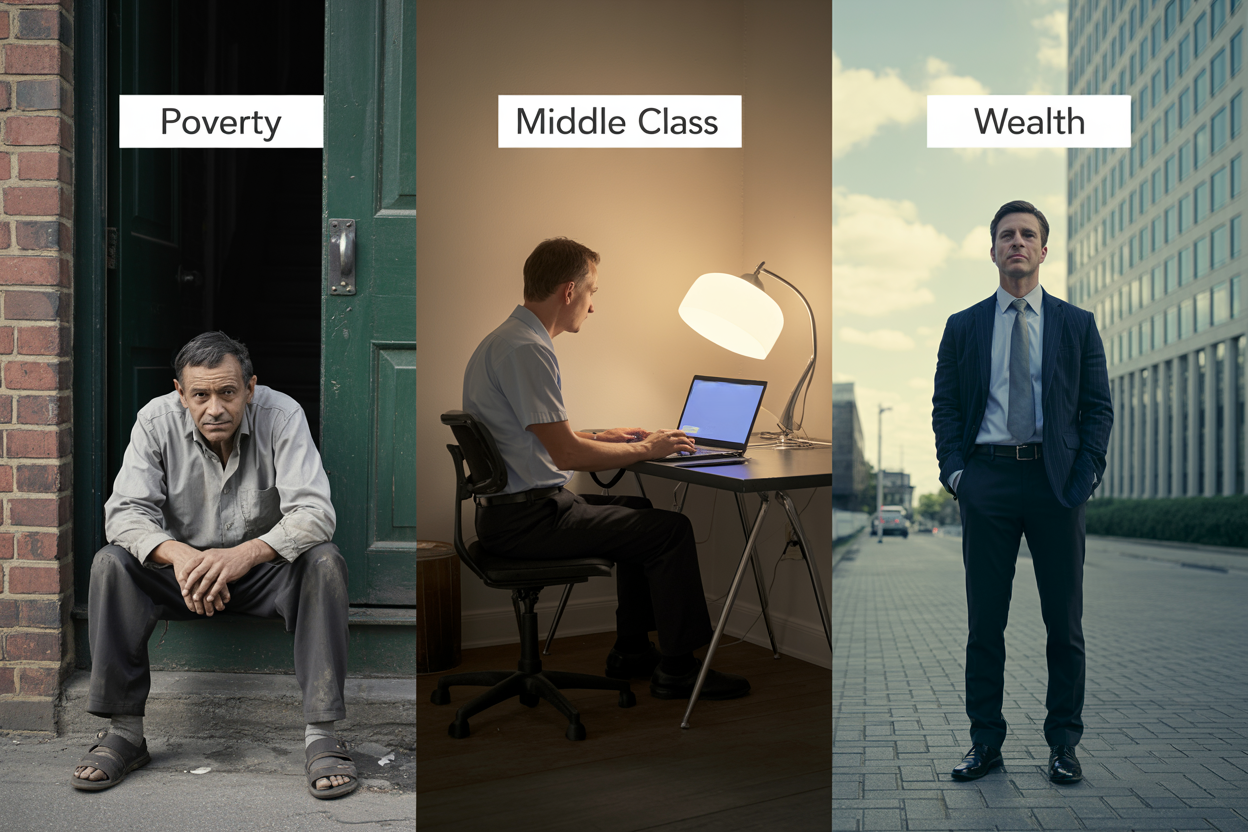
Every social class operates by an invisible playbook—unwritten rules that govern everything from how money is handled to what drives personal ambition. These hidden frameworks shape worldviews, influence daily decisions, and create cultural divides that often go unrecognized. Understanding these distinctions isn’t about perpetuating stereotypes but illuminating how people from different economic backgrounds navigate the world.
Money: Survival, Security, or Strategy
Perhaps no difference is more fundamental than how each class conceptualizes money. For impoverished people, money represents immediacy—it’s meant to be spent because survival demands it. When resources are scarce, meeting today’s needs takes priority over tomorrow’s possibilities.
The middle class views money as something to be managed and planned. Budgets, savings accounts, and retirement plans become tools for creating security against future uncertainties, carefully balancing present needs with future goals.
For the wealthy, money transforms into a wealth-generating tool. Investment portfolios and business ventures become the focus. Wealthy people understand compound interest, tax advantages, and preservation strategies that multiply generational resources.
What Makes Someone Valuable
Each class values different personality traits that reveal what each group needs to thrive. In poverty, humor becomes essential social currency. The ability to laugh, tell stories, and entertain strengthens community bonds, providing crucial support networks.
The middle class prizes achievement above all. Degrees, certifications, and promotions define social standing. Personal accomplishments demonstrate the self-sufficiency and upward mobility that characterize middle-class values.
Among the wealthy, connections reign supreme. Who you know determines opportunities and social standing. The proper introduction can open doors that no amount of individual achievement could unlock. Relationships are cultivated carefully and maintained strategically.
Community: Inclusion, Independence, or Exclusion
Those in poverty emphasize inclusion because survival often depends on community support. When formal systems fail, informal networks of mutual aid become lifelines. Nobody gets left behind because tomorrow you might need help yourself.
Middle-class culture stresses self-sufficiency. The ideal is handling one’s own problems and avoiding being a burden. This stems from the middle class’s position between poverty and wealth—secure enough not to require constant community support but not wealthy enough to hire help.
The wealthy practice exclusion through private clubs, gated communities, and exclusive schools that preserve resources and social capital within established networks. Scarcity of access replaces scarcity of resources.
From Food to Time: Everyday Differences
Even universal experiences reveal class distinctions. Food and quantity matter most in poverty—the priority is having enough to go around. The middle class focuses on quality, with organic produce and nutritional value becoming priorities. For the wealthy, presentation becomes paramount, with food as art, experience, and social statement.
Time orientation differs dramatically. Those in poverty live in the present because the future feels uncertain. Planning is complex when immediate crises constantly demand attention. The middle class lives for the future—retirement accounts and career trajectories reflect investment in delayed gratification. The wealthy view time through tradition, with family legacies and multi-generational wealth strategies creating connections that transcend individual lifetimes.
Education: Abstract, Pathway, or Network
For those in poverty, education often remains abstract—disconnected from daily survival needs. The connection between classroom learning and better outcomes isn’t always visible, particularly when community success stories came through other means.
Middle-class families view education as the primary pathway to success. Grades and degrees directly correlate with career opportunities and earning potential, serving as the vehicle for maintaining or improving class status.
Among the wealthy, education focuses on connections. The right schools provide access to networks that last a lifetime; who you meet matters more than what you learn.
Communication and Control
Linguistic patterns reflect class boundaries. Poverty culture uses casual, direct communication focused on relationships. The middle class employs formal language for professional advancement, with code-switching becoming essential. Wealthy communication emphasizes networking subtleties—knowing what not to say and understanding implicit meanings.
Family structures follow predictable patterns: poverty often creates matriarchal structures where women manage resources; middle-class families tend toward traditional or egalitarian models; in wealthy families, whoever controls the money holds power.
People’s motivations differ fundamentally. Those in poverty are driven by relationships—family and community provide meaning when material resources are limited. The middle class is motivated by achievement and reaching the next level. For the wealthy, preserving wealth and maintaining social position become primary concerns.
Destiny: Fate, Choice, or Expectation
Perhaps most fundamentally, classes differ in their sense of control. In poverty, fate often feels determining. When systems seem rigged and efforts don’t reliably produce results, believing “you can’t control what happens” reflects lived experience.
The middle class believes in choice. Hard work and good decisions determine outcomes. Success is earned; failure is avoidable through proper planning.
The wealthy operate within expectations. Family legacy and inherited responsibility create a predetermined path. Destiny isn’t random fate or pure choice but fulfilling the role that wealth creates.
Bridging the Divide
These hidden rules aren’t moral judgments but cultural frameworks shaped by economic reality. Each class develops values suited to its circumstances. The middle-class teacher puzzled by a student who doesn’t plan, the wealthy employer confused by an employee’s family obligations, the person in poverty frustrated by middle-class formality—all these tensions stem from operating by different unwritten rules.
Recognizing these invisible frameworks is the first step toward genuine understanding across class lines. Only by acknowledging these different playbooks can we bridge divides and build empathy in a society where economic background shapes what we have and how we see the world itself.
